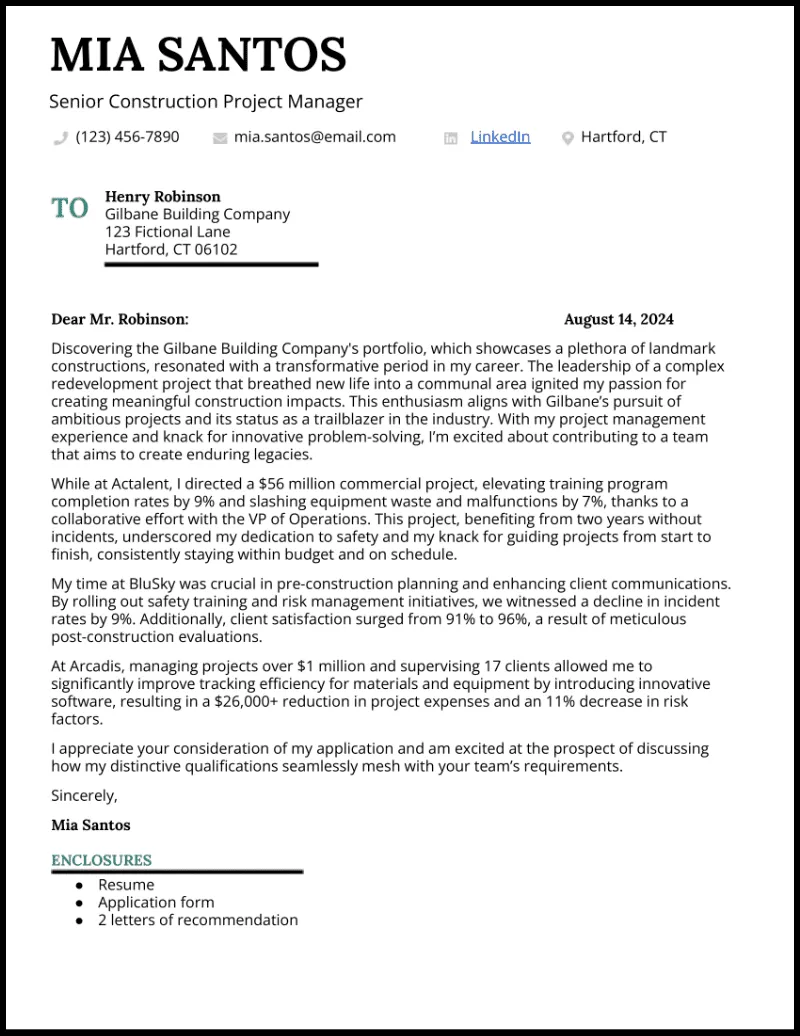Crafting a compelling cover letter is crucial for construction project managers seeking new opportunities. It’s your first chance to make a strong impression, showcasing not only your technical expertise but also your ability to lead, communicate, and drive projects to successful completion. A well-written cover letter can set you apart from other applicants and significantly increase your chances of landing an interview. This guide provides practical advice and insights into creating a cover letter that grabs attention and effectively communicates your value to potential employers.
Highlighting Your Project Management Skills
Your cover letter should immediately spotlight your core project management skills. Construction project management demands a diverse skill set, including planning, organizing, budgeting, risk management, and problem-solving. Clearly state your proficiency in these areas. Use specific keywords from the job description to demonstrate that you possess the skills the employer seeks. Focus on your ability to manage projects from inception to completion, ensuring they are delivered on time, within budget, and to the highest quality standards. Your letter should read like a concise project summary, showcasing your capabilities.
Quantifying Achievements
Instead of simply listing responsibilities, quantify your achievements. Use numbers and data to illustrate your impact. For example, instead of writing ‘Managed construction projects,’ write ‘Managed projects with budgets up to $10 million, consistently delivering them under budget by an average of 5%.’ This approach provides concrete evidence of your accomplishments and demonstrates your value to the company. Show how you’ve improved efficiency, reduced costs, or enhanced project outcomes in previous roles. Every claim should be backed by data or specific examples.
Using Numbers and Data
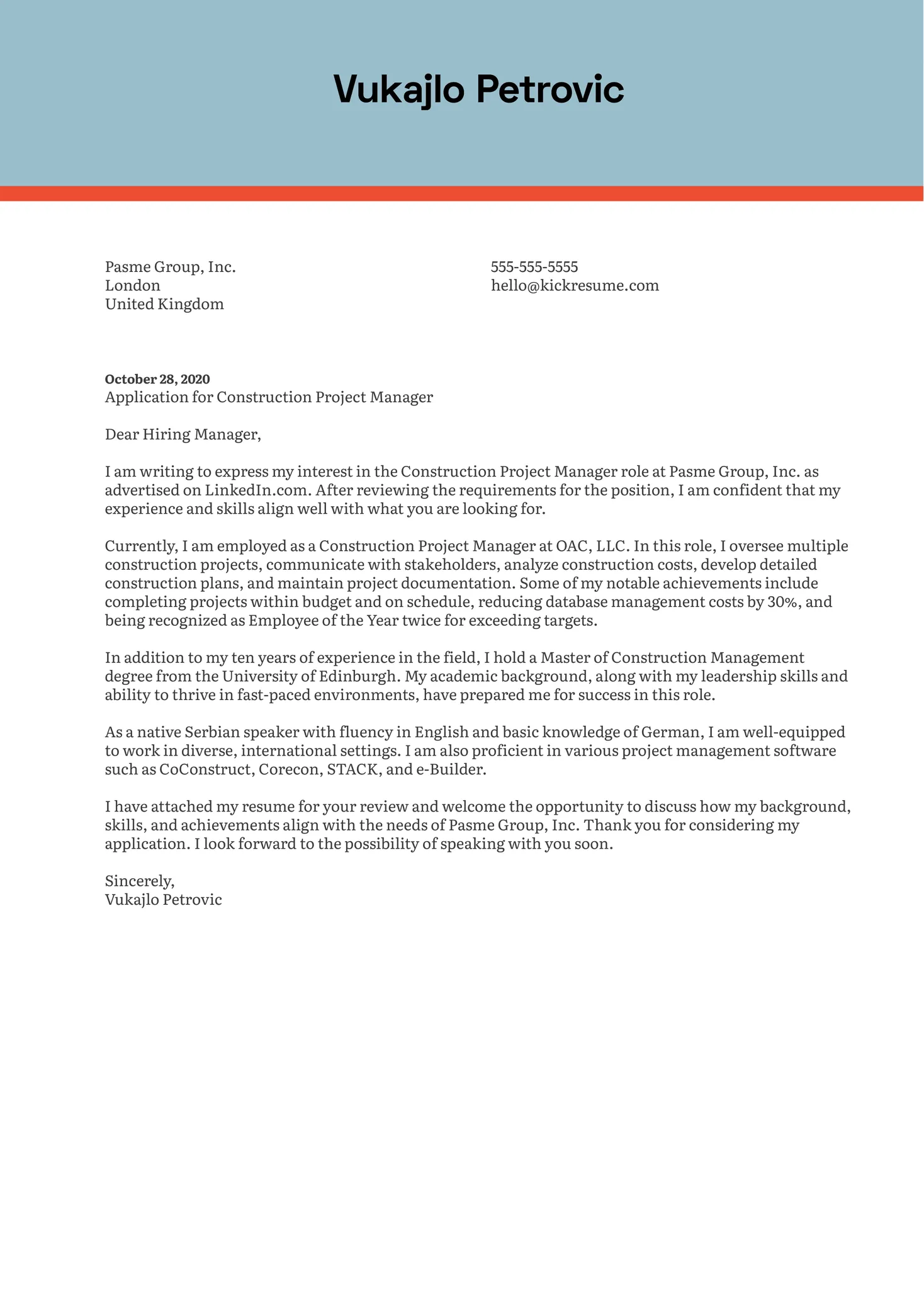
Numbers and data are the language of project management, so make sure you speak it fluently in your cover letter. Include metrics like project completion rates, cost savings percentages, and time-to-completion improvements. Mention the size and scope of projects you’ve managed, the number of team members you’ve led, and any awards or recognition you’ve received. For example, you might state: “Successfully managed over 20 construction projects, resulting in a 15% reduction in project delays and a 10% increase in client satisfaction.” These specific examples reinforce your ability to get results.
Showcasing Relevant Experience
Your cover letter should highlight experiences directly related to the job you’re applying for. Emphasize construction project management roles, focusing on projects with similar scope, size, or type to the one you’re interested in. Briefly describe your responsibilities and the outcomes of each project. If the job requires experience with specific types of construction (e.g., commercial, residential, infrastructure), make sure to mention relevant projects and your familiarity with related building codes, regulations, and technologies. Tailor your language to match the needs of the employer and focus on how your experience aligns with their requirements.
Tailoring the Letter to the Job
A generic cover letter rarely makes a strong impact. Tailor each cover letter to the specific job and company. Carefully read the job description and identify the key skills, qualifications, and experiences the employer is seeking. Use this information to customize your letter, highlighting the aspects of your background that align with the requirements. Research the company and its projects to understand its needs and values. If possible, address your letter to the hiring manager by name, demonstrating that you’ve taken the time to personalize your application.
Demonstrating Leadership Abilities
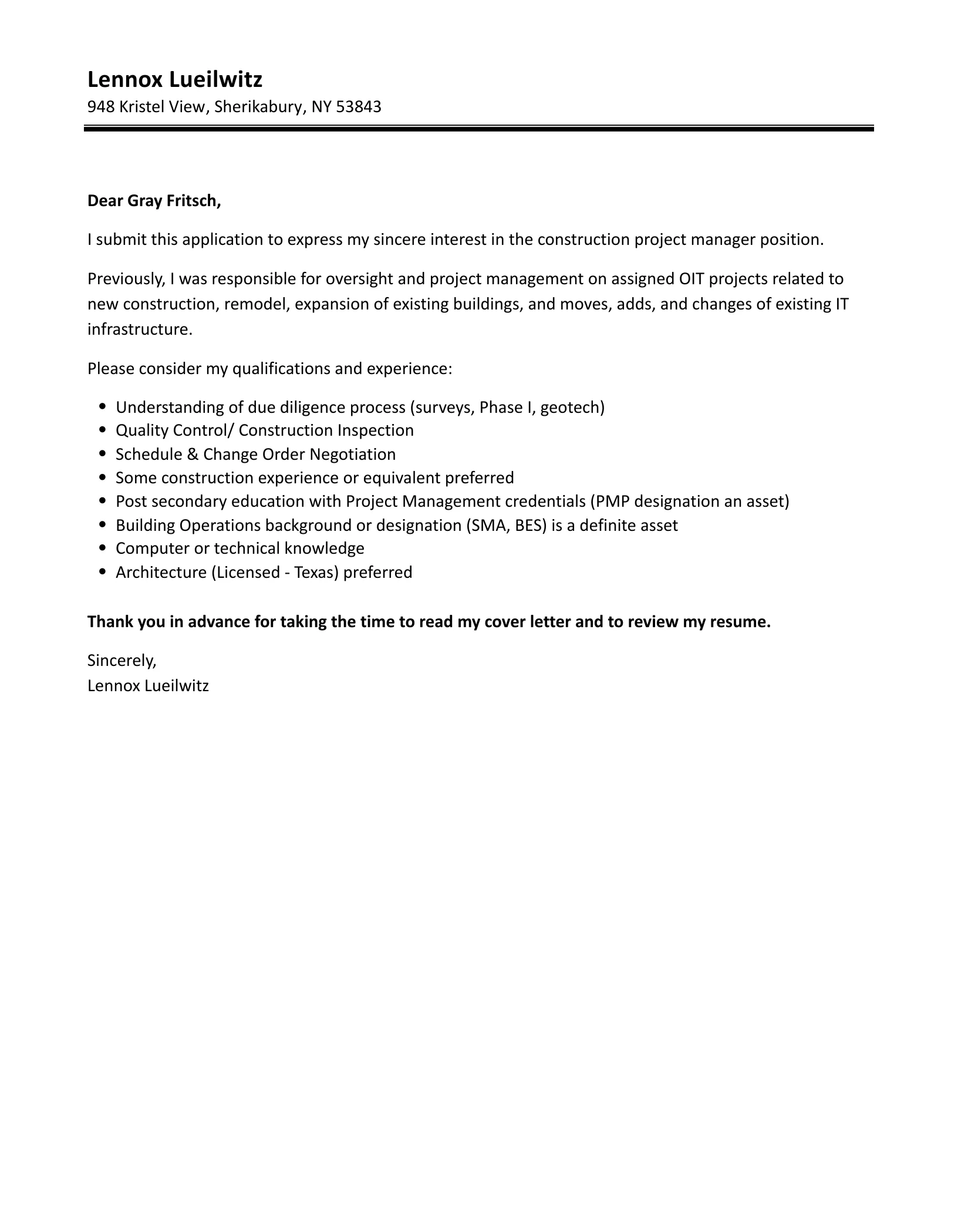
Construction project managers are leaders, so your cover letter needs to reflect your leadership capabilities. Showcase your ability to motivate and manage teams, delegate tasks effectively, and resolve conflicts constructively. Describe your experience in leading project teams, providing guidance, and fostering a collaborative work environment. Highlight how you’ve inspired your teams to achieve project goals, manage their performance, and contribute to the project’s success. Leadership isn’t just about giving orders; it is about mentorship and guidance.
Providing Examples of Leadership
Support your claims of leadership with specific examples. Describe situations where you’ve taken initiative, made critical decisions, or resolved challenging issues. Share instances where you’ve motivated a team to meet deadlines or overcome obstacles. For example, you could write, “During a project delay caused by supply chain issues, I implemented a new procurement strategy, which enabled us to source alternative materials and complete the project on time.” Use the STAR method (Situation, Task, Action, Result) to provide context and highlight the results of your actions.
Mentioning Teamwork and Collaboration
Construction projects involve numerous stakeholders, making teamwork and collaboration essential. Your cover letter should reflect your ability to work effectively with diverse teams, including architects, engineers, subcontractors, and clients. Describe how you’ve facilitated communication, resolved conflicts, and fostered a collaborative environment. Highlight any experience working with cross-functional teams, managing relationships with vendors, or coordinating with regulatory agencies. Provide evidence of your ability to build positive working relationships and maintain open communication channels. It takes a team to finish a project.
Expressing Enthusiasm and Interest
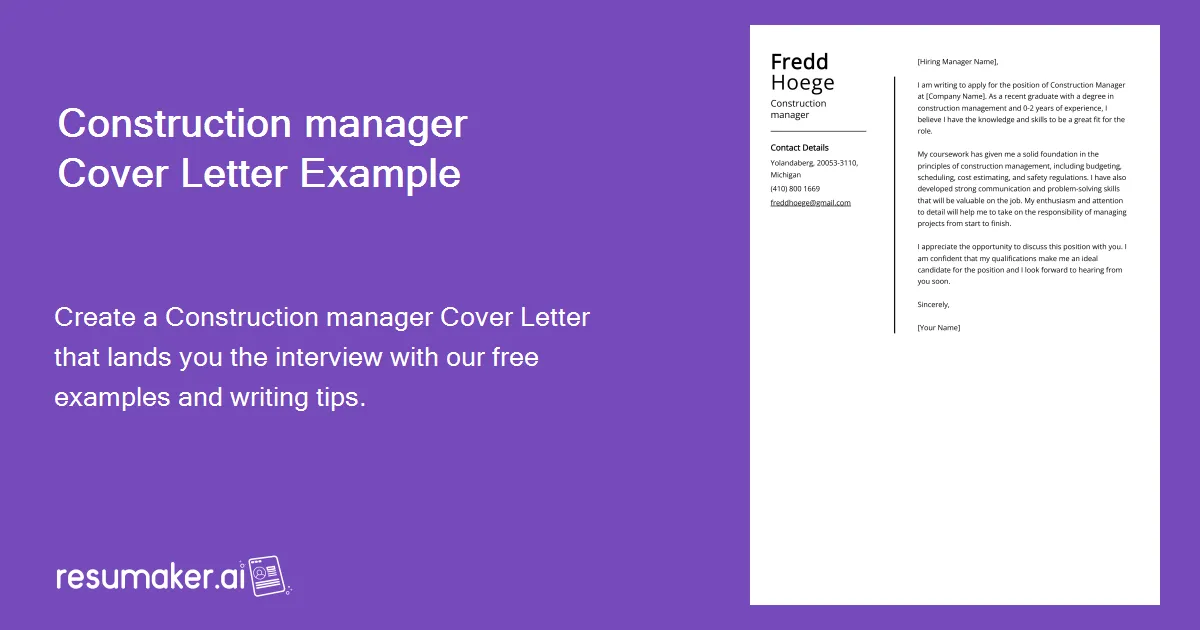
Show genuine enthusiasm for the position and the company. Explain why you’re interested in the role and what attracts you to the organization. Demonstrate that you’ve researched the company and understand its mission, values, and projects. Your cover letter should convey a sense of excitement and a strong desire to contribute to their success. Avoid generic statements; instead, express your genuine interest in the specific opportunity.
Researching the Company
Thoroughly research the company before writing your cover letter. Visit their website, review their social media profiles, and read news articles or press releases about the organization. Understand their projects, their clients, and their values. This research will help you tailor your letter and demonstrate your genuine interest. Identify the company’s key initiatives and how your skills and experience can contribute to their goals. This shows your desire to be part of the team and your long-term commitment.
Emphasizing Your Value
Clearly articulate the value you bring to the company. Summarize your key skills, accomplishments, and how they align with the job requirements. Explain what makes you unique and why the company should hire you. Focus on the benefits you can provide, such as your ability to complete projects on time and within budget, improve efficiency, or enhance client satisfaction. Showcase how your experience and skills can help the company achieve its goals. Be confident and concise in stating your value.
Formatting and Presentation
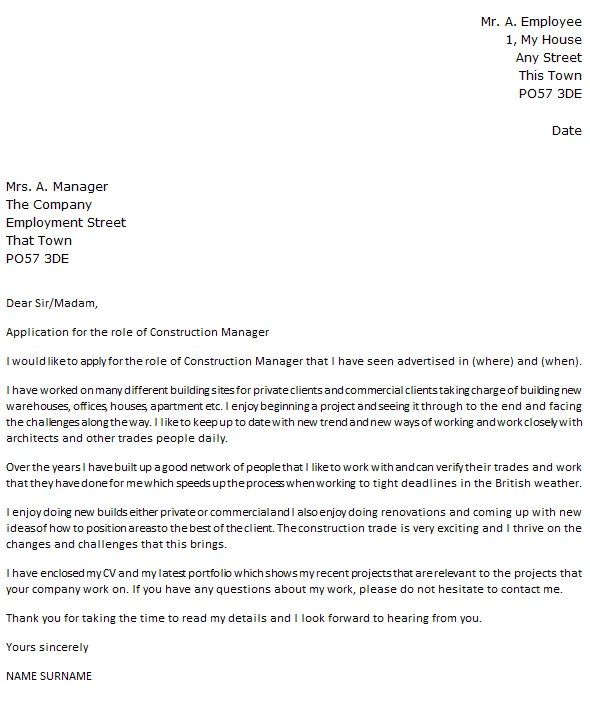
Your cover letter’s formatting and presentation can significantly influence the reader. Use a professional font, such as Times New Roman or Arial, and maintain consistent formatting throughout. Keep your letter concise, ideally within one page. Use clear headings, bullet points, and white space to make your letter easy to read and scan. Ensure your letter is well-organized and visually appealing. A clean and professional layout demonstrates attention to detail.
Using a Professional Tone
Maintain a professional and formal tone throughout your cover letter. Avoid slang, jargon, and casual language. Use proper grammar, spelling, and punctuation. Be polite, respectful, and courteous. Use a positive and confident tone, but avoid being overly assertive or arrogant. Your tone should reflect the values of the company and demonstrate your professionalism. Always address the hiring manager by name if possible, and use a formal salutation and closing.
Proofreading for Errors
Proofreading is crucial to ensure your cover letter is free of errors. Mistakes can undermine your credibility and make a negative impression. Carefully review your letter for grammatical errors, spelling mistakes, and punctuation issues. Read it aloud to catch any awkward phrasing or inconsistencies. Have a friend or colleague review your letter as well. Errors can show lack of attention to detail, so careful proofing can elevate your chances to get the role.
Closing the Letter Effectively
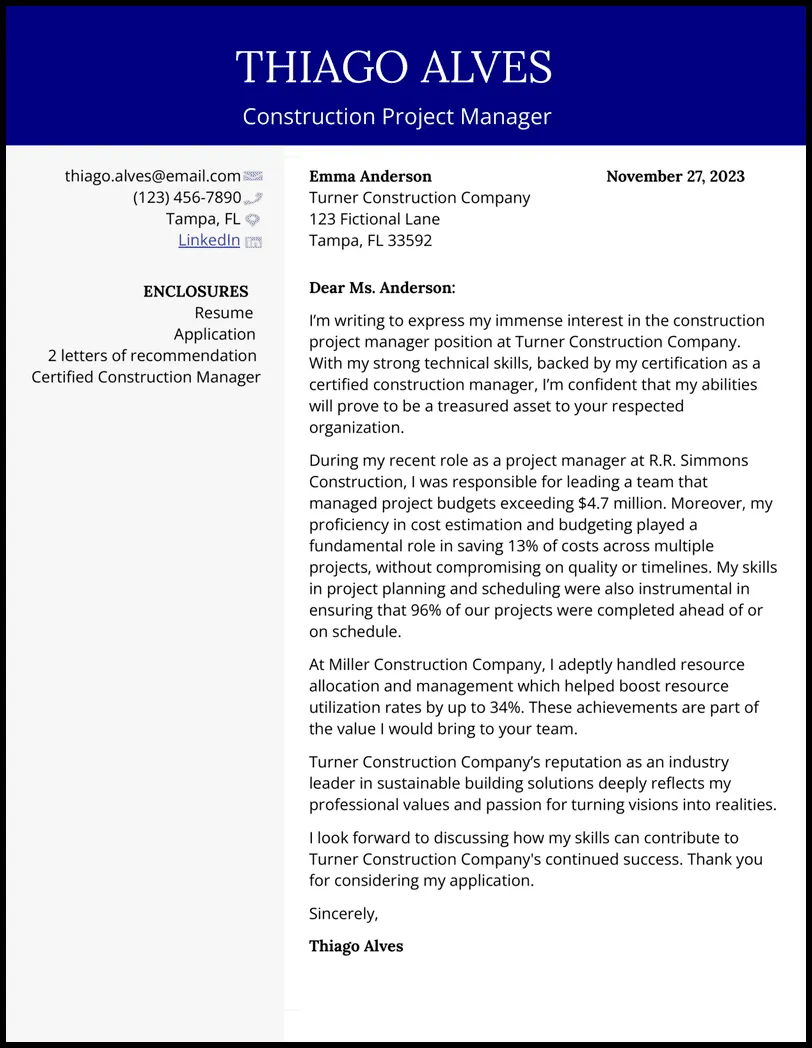
Your closing should leave a lasting positive impression. Summarize your key qualifications and reiterate your interest in the position. Express your gratitude for the reader’s time and consideration. Include a clear call to action, such as inviting them to review your resume or requesting an interview. Your closing should be confident, professional, and leave the reader with a clear understanding of your value.
Summarizing Key Qualifications
In your closing paragraph, briefly summarize your key qualifications and how they align with the job requirements. Reiterate the skills and experiences that make you a strong candidate for the position. Highlight the value you bring to the company, such as your ability to manage projects effectively, deliver them on time and within budget, and contribute to the company’s success. By summarizing your key qualifications, you remind the reader of your strengths and reinforce your suitability for the role.
Expressing Gratitude and Follow-up
Express your gratitude for the hiring manager’s time and consideration. Thank them for reviewing your application and expressing your interest in the role. Include a call to action, such as stating that you are available for an interview or inviting them to contact you with any questions. Provide your contact information, including your phone number and email address. A well-crafted closing demonstrates your professionalism and leaves a positive impression on the reader, increasing your chances of a follow-up.
In conclusion, a well-crafted cover letter is a vital tool for construction project managers seeking employment. By highlighting your skills, quantifying your achievements, showcasing your leadership, and demonstrating your enthusiasm, you can significantly increase your chances of landing an interview. Remember to tailor your letter to each job, use a professional tone, and carefully proofread for errors. By following these tips, you can create a cover letter that effectively communicates your value and helps you secure your next project management role.
